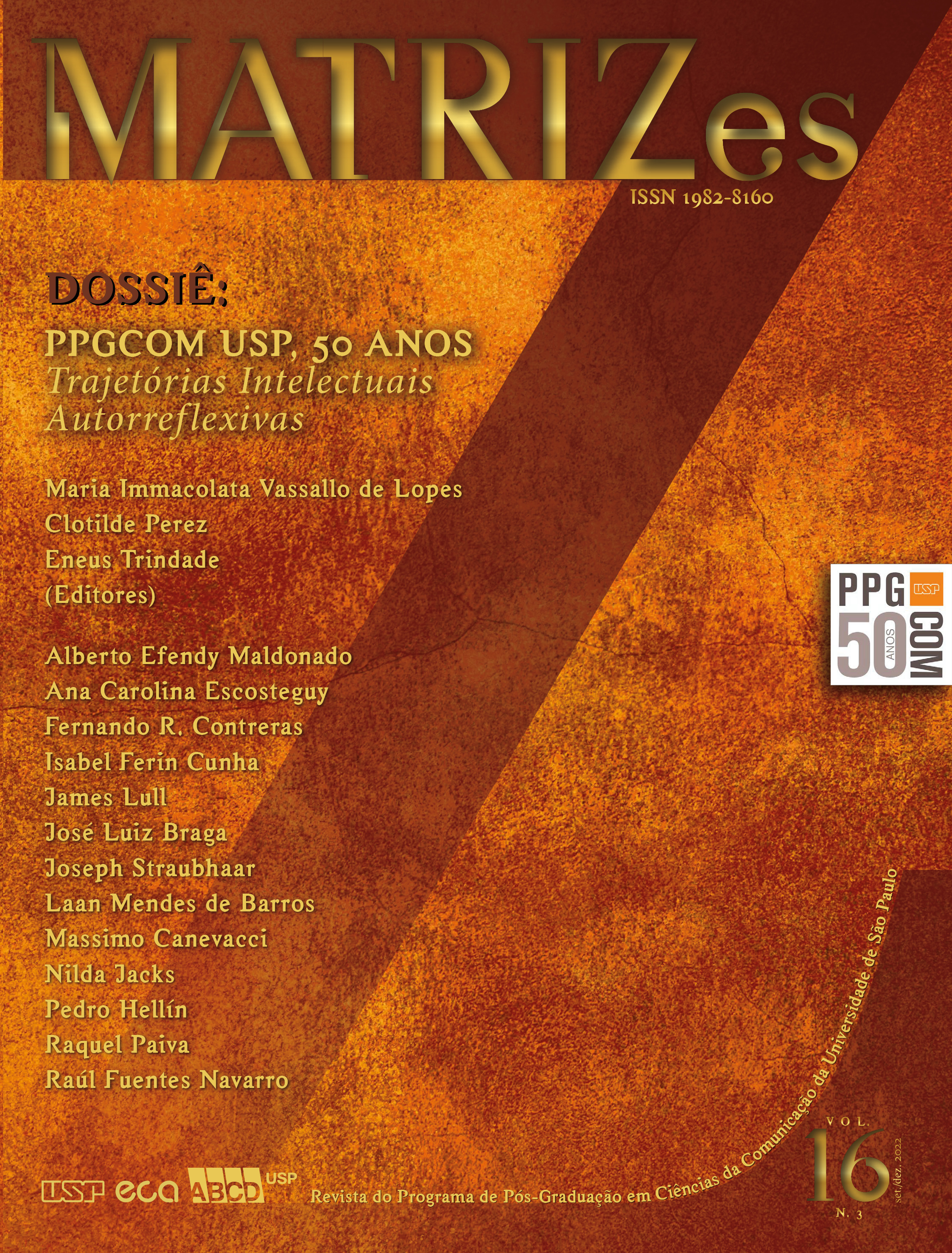Beyond media imperialism: The challenges of theorizing global TV flows
DOI :
https://doi.org/10.11606/issn.1982-8160.v16i3p121-136Mots-clés :
Global media, Brasilian television, TV Globo, INTERCOM, ECA/USPRésumé
This article reviews the intellectual journey that led me to study the development of television in Brazil. It discusses how I came to study how media were developing in countries of the global South as part of a Ph.D. in International Relations. It led me to get particularly interested in Brazil, particularly when I discovered that the US State Department was willing to train me in Portuguese and send me there for three years. It discusses the great intellectual support I received for my research on Brazilian television, TV Globo and cultural dependency, from Prof. José Marques de Melo and others at ECA/USP, in which others like Carlos Eduardo Lins da Silva and Ana Maria Fadul were beginning to look at some of the same issues. It goes on to discuss how interesting and helpful the INTERCOM and ALAIC network of researchers was in learning about the great upswell in Brazilian and Latin American research that was taking place.
##plugins.themes.default.displayStats.downloads##
Références
Grupo de Mídia. (1978). Concentração Econômica e Mídia, III Congresso Brasileira de Propaganda.
Bolaño, C. (1988). Mercado Brasileiro de Televisão. Aracaju, Universidade Federal de Sergipe.
Calmon, J. (1966). Duas invasões: O Livro Negro da Invasão Branca Rio de Janeiro, Edições O Cruzeiro.
Camargo, N. and V. Pinto (1975). Communication policies in Brazil. Paris, The UNESCO Press.
Cardoso, F. H. and E. Faletto (1979). Dependency and development in Latin America. Berkeley, CA, University of California Press.
Commission, M. (1978). One World, Many Voices. Paris, UNESCO.
Dorfman, A. and A. Mattelart (1972). Para leer al pato Donald, Siglo XXI.
Evans, P. (1979). Dependent Development: The Alliance of Multinational, State and Local Capital in Brazil. Princeton, Princeton Press.
Hall, S. (1977). Culture, the Media and the 'Ideological Effect'. Mass Communication and Society. London, Edward Arnold: 315-348.
Hertz, D. (1987). A Historia Secreta da Rede Globo. Porto Alegre (Brazil), Tche.
Horkheimer, M. and T. W. Adorno (1972). The Culture Industry: Enlightenment as Mass Deception. New York, Herder and Herder.
Katz, E. and G. Wedell (1976). Broadcasting in the Third World. Cambridge, Harvard University Press.
Lerner, D. (1958). The Passing of Traditional Society - Modernizing the Middle East. New York, The Free Press.
Lins da Silva, C. E. (1985). Muito Alem do Jardim Botanico. Sao Paulo, Summus.
Mattos, S. A. S. (1990). Um perfil da TV Brasileira (40 anos de história: 1950-1990). Salvador, Associação Brasileira de Agências de Propaganda.
Miceli, S. (1972). A Noite da Madrinha. Sao Paulo, Editora Perspectiva.
Milanesi, L. A. (1978). O Paraiso via EMBRATEL. Rio de Janeiro, Editora Paz e Terra.
Newcomb, H. and P. Hirsch (1983). "Television As A Cultural Forum: Implications for Research." Quarterly Review of Film Studies(Summer).
Nordenstreng, K. and T. Varis (1974). Television Traffic--A One-Way Street. Paris, UNESCO.
Ribke, N. (2011). "DECODING TELEVISION CENSORSHIP DURING THE LAST BRAZILIAN
MILITARY REGIME." Media History 17(1): 49 — 61.
Schiller, H. I. (1969). Mass Communication and American Empire. Boston, Beacon.
Schramm, W. (1964). Mass Media and National Development. Stanford, CA, Stanford University Press.
Sodre, M. (1972). A comunicacao do grotesco. Rio, Editora Vozes.
Straubhaar, J. (1984). "The Decline of American Influence on Brazilian Television." Communication Research 11(2): 221-240.
Wallach, J. (2011). Meu capítulo na TV Globo. Rio de Janeiro, Editora Topbooks.
Téléchargements
Publiée
Numéro
Rubrique
Licence

Ce travail est disponible sous licence Creative Commons Attribution - Pas d’Utilisation Commerciale - Partage dans les Mêmes Conditions 4.0 International.
Les auteurs qui publient dans ce journal acceptent les termes suivants:
- Les auteurs conservent le droit d'auteur et accordent à la revue le droit de première publication, le travail étant concédé simultanément sous la licence Creative Commons Attribution (CC BY-NC-SA 4.0) qui permet le partage de l'œuvre avec reconnaissance de la paternité et de la publication initiale dans cette revue à des fins non commerciales.
- Les auteurs sont autorisés à assumer des contrats supplémentaires séparément, pour une distribution non exclusive de la version de l'ouvrage publiée dans cette revue (par exemple, publication dans un référentiel institutionnel ou en tant que chapitre de livre), avec reconnaissance de la paternité et de la publication initiale dans cette revue.






















